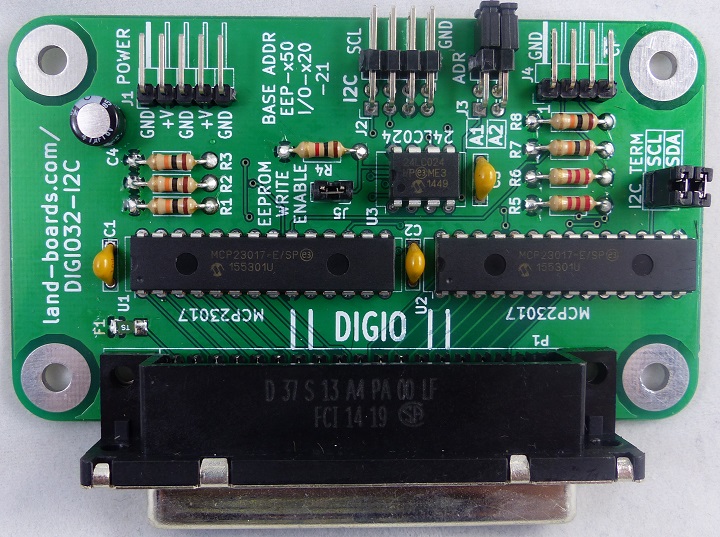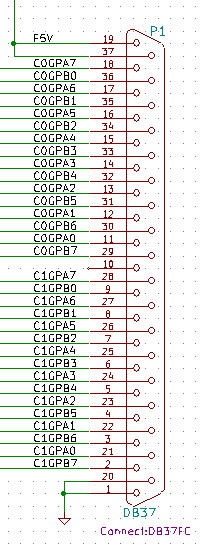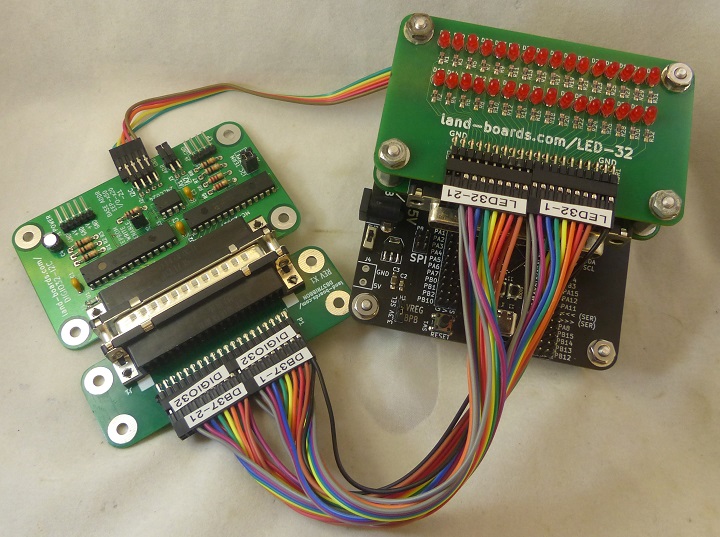Difference between revisions of "DIGIO32-I2C"
Jump to navigation
Jump to search
Blwikiadmin (talk | contribs) |
Blwikiadmin (talk | contribs) |
||
| Line 64: | Line 64: | ||
*** Find COMx using Device Manager | *** Find COMx using Device Manager | ||
** 9600 baud | ** 9600 baud | ||
| + | |||
| + | ==== Program EEPROM ==== | ||
| + | |||
* Run [https://github.com/land-boards/lb-Arduino-Code/tree/master/LBCards/ODAS/ODASTESTER ODASTESTER] Software | * Run [https://github.com/land-boards/lb-Arduino-Code/tree/master/LBCards/ODAS/ODASTESTER ODASTESTER] Software | ||
** Type E to select EEPROM menu | ** Type E to select EEPROM menu | ||
| Line 69: | Line 72: | ||
** Type 5 to select DIGIO32-I2C card | ** Type 5 to select DIGIO32-I2C card | ||
** Type X to exit to top level menu | ** Type X to exit to top level menu | ||
| − | + | ||
| − | + | === Bounce LED Test ==== | |
| + | |||
| + | * Type C to select card test | ||
| + | * Type B to bounce LED across the UUT card | ||
* Should see the LEDs go around the [[LED-32]] card | * Should see the LEDs go around the [[LED-32]] card | ||
* Hit any key to stop (after finishing rotation) | * Hit any key to stop (after finishing rotation) | ||
| + | |||
| + | ==== Alternate card Test ==== | ||
| + | |||
| + | * (2) [[DB37BIBBON]] cards | ||
| + | * Cables to connect two [[DB37BIBBON]] cards | ||
| + | * Type C to select card test | ||
| + | * Type T to test the card | ||
| + | * puTTY will display test pass/fail | ||
| + | * Can set L for loop test then T to run test | ||
* Mark bottom TEST block on bottom of card | * Mark bottom TEST block on bottom of card | ||
Revision as of 16:39, 6 March 2022
Contents
Features
- 32-bit Digital I/O
- Two MCP23017 16-bit I2C I/O Expanders
- EEPROM for board ID and application specific information
- Write Enable jumper protects EEPROM against accidental damage
- I/O Connector is inexpensive/standard DB-37
- I2C Interface
- Daisy-chain I2C connector
- I2C Termination jumpers for end of I2C chain
- I2C Address select jumper (2 addresses - can support up to 4 cards)
- Power Options
- Supports 3.3V or 5V signal levels
- Fuse protected power output on DB-37
- Power connector (not required for minimal loads
- ODAS form factor (width is 95 mm)
- 6-32 Mounting holes
Connectors
DB-37 Pinout
Schematic
Drivers
- GitHub repo for the DigIO32-I2C Card Arduino Driver
- GitHub repo for the DigIO32-I2C Card Arduino examples
Testing
Cards
- Arduino Based Test Station
- Black Pill Hub
- A copy of this card (not used for bounce LEDs test)
- LED-32
- DB37RIBBON plugged into UUT
- (2) of 2x10 cables to connect between DB37RIBBON and LED-32
- DB37-1 marked on cable end goes near P1 marked on DB37RIBBON
- LED32-1 marked on cable end goes near HDR1 marked on LED-32
- I2C cable from Arduino Based Test Station to I2C connector on UUT
- Unit Under Test (UUT)
- Check chip pin 1 orientation
- Power test card for shorts
Card Test Procedure
- Connect USB-C to Test Station
- Run puTTY on PC
- Select serial port
- Find COMx using Device Manager
- 9600 baud
- Select serial port
Program EEPROM
- Run ODASTESTER Software
- Type E to select EEPROM menu
- Type W to write EEPROM
- Type 5 to select DIGIO32-I2C card
- Type X to exit to top level menu
Bounce LED Test =
- Type C to select card test
- Type B to bounce LED across the UUT card
- Should see the LEDs go around the LED-32 card
- Hit any key to stop (after finishing rotation)
Alternate card Test
- (2) DB37BIBBON cards
- Cables to connect two DB37BIBBON cards
- Type C to select card test
- Type T to test the card
- puTTY will display test pass/fail
- Can set L for loop test then T to run test
- Mark bottom TEST block on bottom of card
////////////////////////////////////////////////////////////////////////////////////// // uint8_t testDigio32Card() - Test the DIGIO32 card. // The Test Station and the UUT both are DIGIO32 cards. // Cable from UUT DB-37 connector to the DIGIO32 card DB-37 in the Test Station. // The DIGIO32 internal to the Test Station is set to all inputs with pull-ups. // The DIGIO32 that is the UUT is set up to all outputs. //////////////////////////////////////////////////////////////////////////////////////



